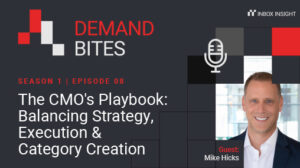Measuring brand awareness remains a key challenge for B2B companies due to its intangible nature, causing it to all too often become overlooked in multichannel strategy.
Marketing teams tend to seek more quantifiable results that can demonstrate ROI – particularly when pressure from stakeholders places emphasis on targets and objectives, requiring accurate reporting to establish how well they are being met.
However, the importance of brand awareness shouldn’t be disregarded. Our first party market research conducted among 200 senior B2B marketing professionals in our Insights for Professionals (IFP) community reveals why brand recognition is in fact a crucial to the success of B2B marketing strategies.
Why should brand awareness feature in your B2B multichannel strategy? Read on to discover 5 key reasons…
Reading time: 6 minutes
What is brand awareness?
Brand awareness is all about people’s ability to recognize and remember your brand. You want to achieve top of mind awareness, always. This way, your current customers will keep coming back and your target audience (and prospective customers) will remember you ready for when they require your product or service.
The following diagram demonstrates how external channels such as Social Media and Paid Media have the ability to increase your audience reach, achieve greater buyer engagement and attract early interest. This reflects the top areas of planned investment in Paid Social (47%), Direct Display (39%) and Programmatic Advertising (38%) as highlighted in our research findings, all of which contribute to building brand awareness.
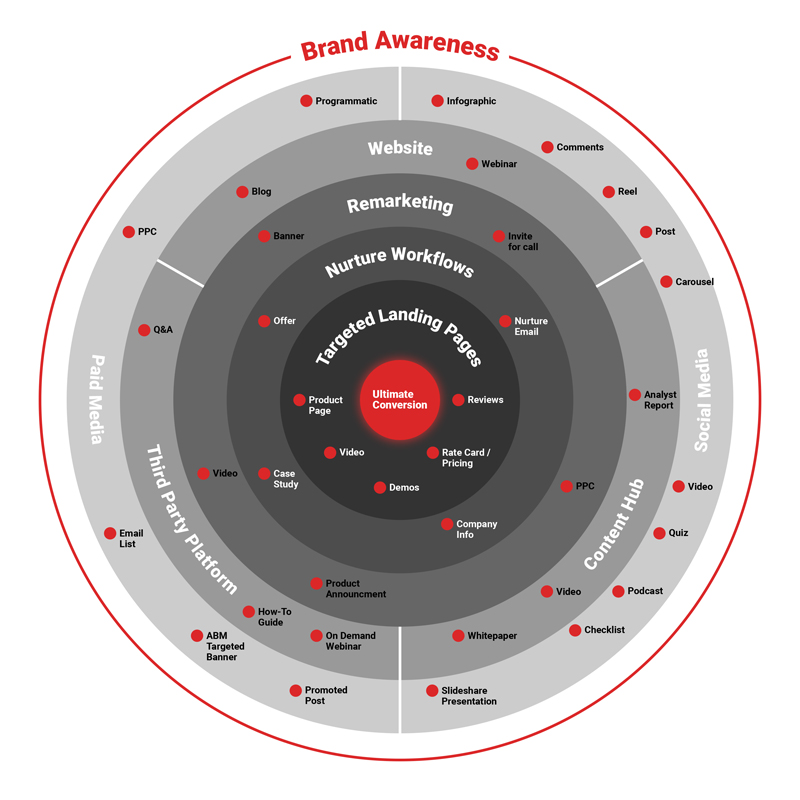
Why is B2B brand awareness so important?
Measuring the impact of brand awareness activity poses a pivotal challenge for 42% of senior B2B marketers when it comes to multichannel analytics. However, our research shows a return to focus with 12% allocating over 75% and 57% allocating over 50% of their budget towards brand awareness. This demonstrates how much B2B companies are prepared to invest more in brand exposure, highlighting its importance in B2B multichannel strategy.
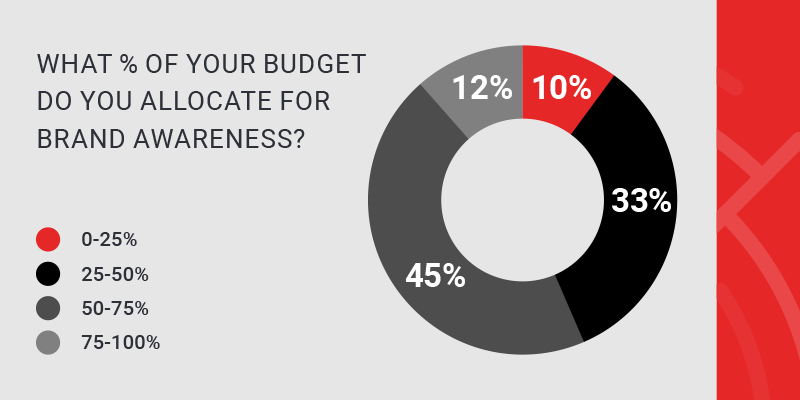
Taking a deeper look at those who reported to have an advanced strategy, 66% assign 50%+ of their marketing budgets towards brand awareness efforts, with just 17% looking to assign less than 50%. This indicates how a multichannel marketing strategy requires an effective and well-polished B2B brand awareness strategy in order to be considered advanced and high performing.
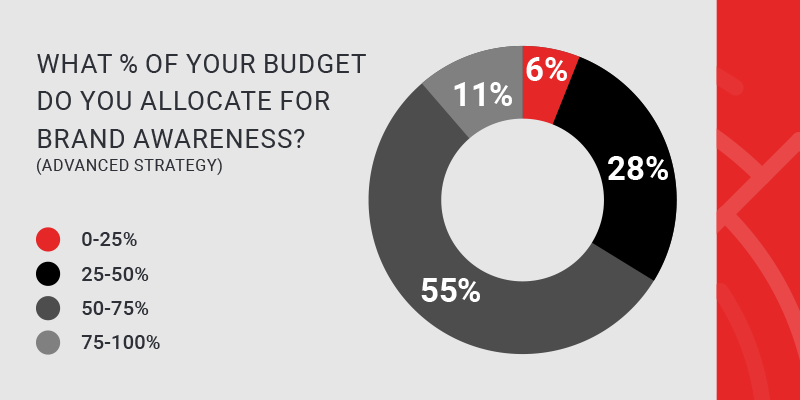
Meanwhile, 43% of marketers plan to outsource brand awareness. Perhaps they lack the specialist in-house skills and knowledge to truly understand how to build and accurately measure brand awareness, or maybe they recognize the importance of B2B brand awareness and choose to outsource to experts to ensure it’s done to the best ability for the results it can achieve.
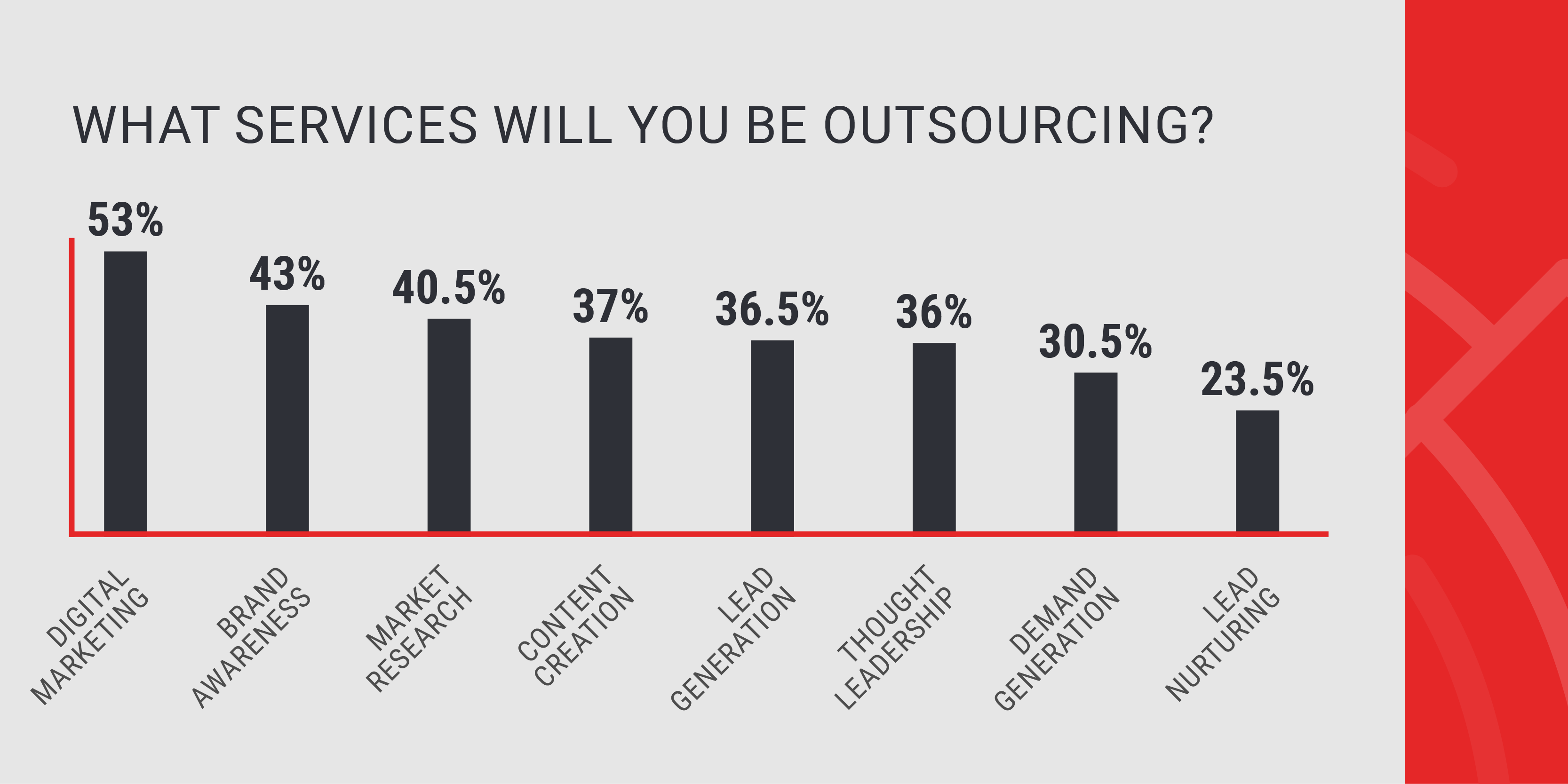
There’s no doubt brand awareness can have a huge impact on the success of a campaign, and it’s crucial for marketers to factor this into their multichannel strategies. Doing so will benefit you in 5 ways:
1. Keeps your brand at the forefront of current and potential customer’s minds
Brand awareness provides the ultimate foundation for customer acquisition. It’s top of the marketing funnel and has the ability to increase the span of your audience reach, enabling potential buyers to hear your message while nurturing those most interested in it. When done well, brand awareness means your business is always in people’s minds – jumping straight to the forefront when they seek a solution.
2. Increases customer loyalty
When customers know your brand they become comfortable with it, familiar of your products and know exactly what they’re going to get – their expectations are set. So when faced with a decision to purchase from your brand or from one of your competitors, they are far more inclined to buy from you for the established sense of relationship and trust.
After all, returning customers spend 67% more than new customers. Therefore the more loyal your customers, the more they are likely to spend. What’s more, customer retention is renowned for being more profitable than customer acquisition, with research revealing that holding onto just 5% more customers businesses can see profits increase anything from 25%-95%. Customer loyalty is clearly a key priority, and brand awareness can greatly contribute.
3. Expands audience reach
PPC and Paid Social marketing campaigns to drive social media brand awareness allow your content to reach target audiences and market segments at scale – even previously untapped ones. This increased reach drives greater website traffic, helps to nurture leads and enhances brand affinity, all of which contribute to the ultimate goal of conversions.
4. Boosts sales, market share and brand equity
Brand awareness underpins brand equity, which is all about defining a brand’s value based on overall customer experiences with and perceptions of a brand. The greater the brand equity, the greater the volume of sales thanks to the positive perceptions of your brand. In turn this leads to higher market share and even the ability to increase prices in line with the perceived value of your brand.
5. Drives word of mouth marketing
A successful, well thought out and mastered B2B brand awareness strategy can instantly change how buyers perceive your business, contributing to overall brand attractiveness and loyalty. It can even prompt B2B customers to share their positive experiences at no cost to your bottom line – through word of mouth marketing. This is highly advantageous for B2B marketers; the more people trust and think about your brand, the more they will talk about it to others and share their experiences without even needing to be prompted.
How can you increase brand awareness?
Once you’ve established an effective B2B brand awareness strategy, it’s important not to let it become idle. Enhancing your current brand awareness and striving to constantly increase it is vital for B2B marketers looking to keep people talking about their brand without an ad in sight.
Discover how to keep driving brand exposure long after your initial strategy is established with these 6 essential steps…
Create a consistent message across multiple channels
Aim to reach and engage the right people, at the right time, on the right channel. Ensure your message is consistent to promote a seamless cross-channel experience which lines up with your overarching multichannel marketing strategy.
Support your organic social strategy with additional reach tactics
Organic Social is great, but Paid Social takes your social exposure to the next level. It can significantly increase your audience reach and brand recognition through asking the right questions and showcasing relevant, timely social media content which can engage and resonate with potential B2B buyers. Not utilizing this channel in today’s digital world can leave you looking considerably behind your competitors.
Use a combination of segmented personas and 1-1 Targeting
Adopting solus email or direct mail approach which reaches directly to an individual who fits your ICP, alongside broader segmentation targeting tactics can ensure you are getting an accurate personalized message to the right individual. Examples of this might be solus Email marketing.
Email plays a central role in multichannel strategy, often being the main communications channel tying various other channels together. This encourages channel alignment for a more unified, seamless multichannel experience. It’s no wonder 42.5% of senior B2B marketers are looking to invest more in this channel, while a quarter believe it is most critical to their strategy.
Leverage channels with significant reach and data
Programmatic buying for broad reach channels can embed in-depth data into the media tactics, this can use first, second and strategic third party data sources to achieve enhanced targeting and positioning to generate the right response. Programmatic buying helps to develop, retain and nurture prospects anywhere in B2B sales cycles – ensuring your brand remains top of mind.
A combination of Programmatic Advertising, Solus Email Marketing, and Paid Social Media ensures the deployment of timely messages at critical touch-points across different inventory sources to create an immersive B2B brand awareness campaign. For each marketing campaign, we tailor the phasing and objectives to drive not just impressions but also engagement, ensuring the people you are advertising to make a lasting connection with your brand.
Create original relevant content
Tailor info-graphics, videos, webinars and podcasts on top of your blogs and whitepapers to create easy-to-digest content, designed for different members of a buying group, into interesting and more relevant visual formats. Content is a great way to build brand awareness and with the right keywords and a strong focus on not only attracting interest, but being useful and educating people who read it, it can help to build the credibility of your brand.
Sponsor events
Being the sponsor of a large event such as industry trade shows, exhibitions and conferences gets your brand name, logo and messaging out to hundreds, sometimes thousands, of relevant industry professionals in one hit. It’s a guaranteed way to ensure you are being seen and heard. From pens to banners to presentations, your brand will be shown everywhere when you sponsor any event.
Harness the power of brand awareness…
Brand awareness can bring major benefits to your multichannel strategy, hence why 57% of senior B2B marketers choose to allocate 50%+ of their budget towards achieving and building it. It’s important to remember that brand exposure is not just about driving traffic and engagement – it has the ability to boost sales and brand equity, enhance customer loyalty and encourages top of mind awareness. Key to all of this is to constantly build and develop your B2B brand awareness strategy. Master this and the ROI will follow.






